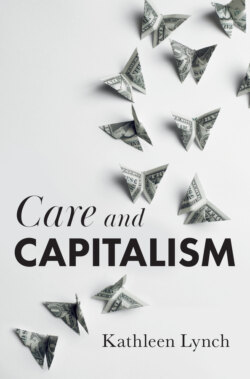Читать книгу Care and Capitalism - Kathleen Lynch - Страница 12
Neoliberal Capitalism
ОглавлениеAs with all forms of capitalism, neoliberal capitalism promotes the protection of private property and the privatization of assets. In addition, neoliberalism promotes state endorsement of free market economic systems across national and global settings, and the institutionalization of market-based cultural logics and values throughout public and private organizations. The state is defined as an agent of capital by providing it with legal protections to enforce contracts, protect property rights, and protect markets in times of economic crisis (Friedman 1948; Hayek 1960, 1994). As a corollary to this, neoliberalism prescribes limited investment in public services, based on its ideal of a small, ‘cheap’ state in welfare terms. The primary purpose of education and welfare institutions is seen as conditioning and training individuals to be self-reliant, individually responsible and entrepreneurial. In this self-reliant society, the need for public services will be greatly reduced if not eliminated. To ensure the restructuring of public services, neoliberals advocate for new managerial policies and corporate-style accountability metrics and performance indicators. These are regarded as mechanisms for eliminating wastefulness, monitoring and improving performances, and maximizing ‘customer’ satisfaction (Chubb and Moe 1990; Friedman 2002).
Neoliberalism also builds on the idealization of choice in classical liberalism, prioritizing freedom over equality. In cultural terms, it is assumed that the market can replace the state as the primary producer of cultural logic and cultural value. The citizen mutates from a person with rights vis-à-vis the state to a market actor, a consumer, an economic maximizer, a free chooser. As neoliberal capitalism endorses a form of entrepreneurial individualism that is highly competitive and self-referential (Harvey 2005; Bröckling 2015; Mau 2015), and as it regards these traits as natural and desirable (Friedman 2002), it is antithetical to caring and affective justice in deep and profound ways (Federici 2012; Fraser 2016; Oksala 2016).
To create a new narrative to challenge the ethics of capitalism in its current mutation, it is necessary to move beyond the non-relational, self-referential ontology that underpins neoliberalism’s culture and politics. This means building a care-centric, relational concept of the individual person and of the wider economic, socio-political and legal order (Folbre 1994; Tronto 1993, 2013; Fineman 1995, 2004; Herring 2020).
While it would be foolhardy not to recognize the power of markets and the economy in determining the dynamics of social life, it is equally important not to place ‘capital at the gravitational centre’ of all ‘meaning making’ (Gibson-Graham, Cameron and Healy 2016: 194). A new paradigm is required, one that moves beyond the narrow capitalocentrism3 of current thinking about social change (Gibson-Graham 1996). People have a care consciousness (Crean 2018) that gives purpose and meaning to everyday life. Their relationalities are central to their identities, impacting on their ambitions and priorities (Lynch, Baker and Lyons 2009) in ways that could and should be harnessed intellectually and politically to drive egalitarian and care-led social change (Care Collective 2020).
